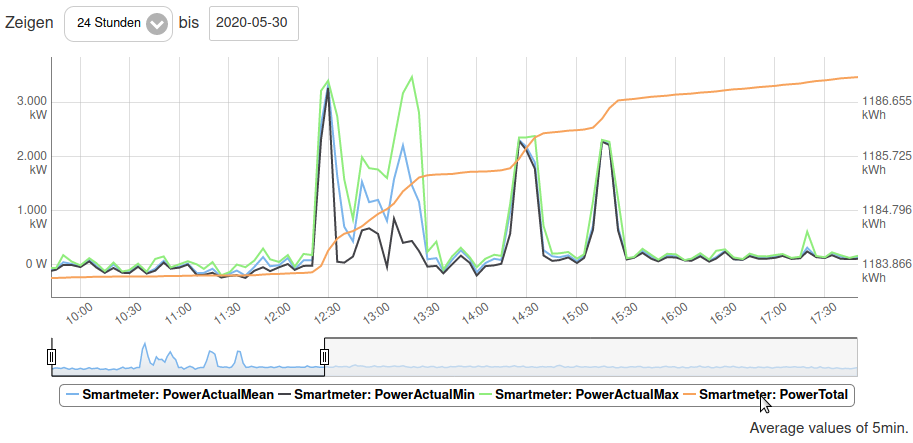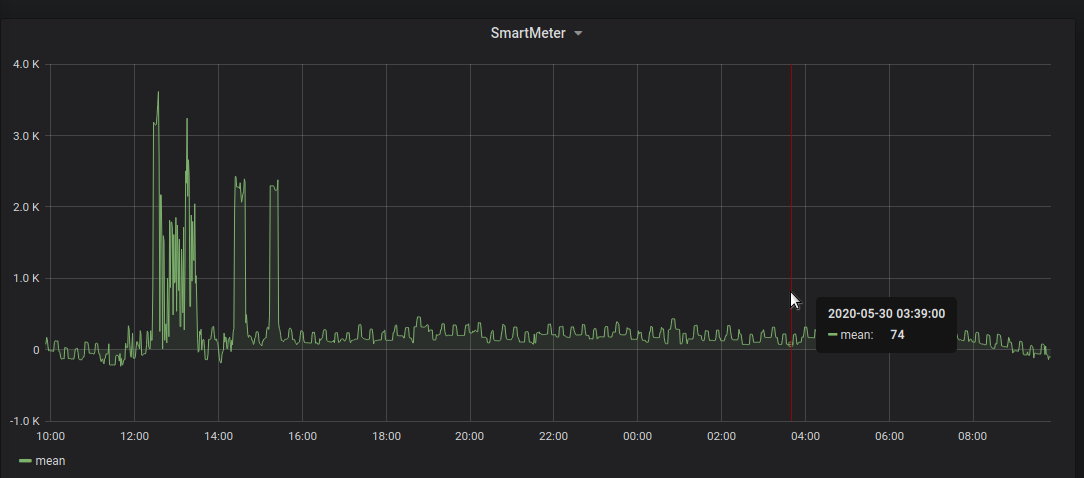Process Smart Message Language (SML) from power smart meters with SML infra-red (IR) interface.
It depends heavily on the great libsml library (GPL3 license), forked from volkszaehler/libsml.
Concept:
- This implementation uses a Rasperry Pi Zero with an atatched serial optical TTL reader to capture SML data sent by a power smart meter.
- The SML processing is done by libsml.
- libsml's textual output is parsed, aggregated for a 1 minute time window and forwared as MQTT statements.
- The MQTT messages are used in e.g., Pimatic.org smart home app to display the power consumption history, or using Grafana.
I want to monitor the live/current power consumption, and I want the values as MQTT messages.
- Know the current power consumption, e.g., to detect peaks, evaluate power production by photovoltaic system, save electricity, etc.
- The power grid operator installed a power smart meter which has an optical interface. This interface tells about the actual/current power consumption, encoded as SML messages.
- Aggregate the every-minute data for a time window (e.g., 1 minute) to produce mean, median, min/max, etc.
- Periodically (e.g., 1 minute) publish that aggregated data as MQTT messages.
- Python 3.5+
- Python version or code level must be compatible to the Python version on the target system, e.g., Python 3.5 for Raspbian Jessie (05/2020).
- Python pipenv
- wget
- volkszaehler/libsml, version 6609c8117ba
Hardware and runtime requirements:
- Raspberry Pi Zero with Raspbian Jessie.
- Optical TTL IR reader, directly attached to the Raspi TTL serial TX/RX GPIO pins.
git clone --recurse-submodulesthis repository- ATTENTION:
--recurse-submodulesis needed (e.g., for libsml)!
- ATTENTION:
pipenv --site-packages sync- Build
sml_server_time, see sml_server_time/README.md. - Run in activated virtualenv and study CLI help:
pipenv run python smltextmqttprocessor.py --help - Create local configuration file and adjust settings:
cp config.template.ini config.local.ini- MQTT configuration: server host, port, user/password
single_topicboolean switch for all data in one single MQTT topic (default isfalse)
- Serial port configuration
- Block/Window size (for data aggregation)
- MQTT configuration: server host, port, user/password
- Run in activated virtualenv:
./sml_server_time/sml_server_time /dev/ttyAMA0 | pipenv run python smltextmqttprocessor.py --config config.local.ini -
After setting up, use systemd script in ./scripts/systemd/.
Basically it runs:
ExecStart=/bin/sh -c '/opt/smlmqttprocessor/sml_server_time/sml_server_time /dev/ttyAMA0 | /opt/smlmqttprocessor/.venv/bin/python3 /opt/smlmqttprocessor/smltextmqttprocessor.py --config config.local.ini -q -'
The processing pipeline is:
| Input | Processing | Output |
|---|---|---|
| Decoded SML data from IR smart meter reader | smltextmqttprocessor.py | MQTT messages |
TTL IR read-write reader, see volkszaehler.org.
My power smart meter model is Iskraemeco MT631. For details see Wiki page of Volkszaehler.org:
- "The meter has a bidirectional IR interface in the upper right corner, which can be read by means of an IR read-write head at 9600bd, 8N1. The connection cable of the read head points down."
- "The meter outputs the data in SML without request."
The SML data is like (also see libsml examples):
1B1B1B1B010101017605013880316200620072630101760101050068
2ABB0B0A0149534B0004325EC57262016500682793620163F9AB0076
0501388032620062007263070177010B0A0149534B0004325EC50701
00620AFFFF7262016500682793747707010060320101010101010449
534B0177070100600100FF010101010B0A0149534B0004325EC50177
070100010800FF65001C810401621E52FF65001E5A99017707010010
0700FF0101621B5200521A01010163BF270076050138803362006200
726302017101635567000000
The IR interface sends the SML data with a frequency of 1 signal per second.
sml_server_time/sml_server_time /dev/ttyAMA0 | /python3 smltextmqttprocessor.py -
The output of sml_server_time is piped to smltextmqttprocessor.py.
| Input | Processing | Output |
|---|---|---|
| TTL serial data, from smart meter | SML decoding | decoded, textual output |
See sml_server_time/README.md. The executable binary sml_server_time is based on the libsml-example sml_server, but modified to also include the act_sensor_time data field.
The output of sml_server_time looks like (decoded SML data):
1-0:96.50.1*1#ISK#
1-0:96.1.0*255#0a 01 49 53 4b 00 04 32 5e c5 #
1-0:1.8.0*255#198927.3#Wh
1-0:16.7.0*255#26#W
act_sensor_time#6825875#
| Input | Processing | Output |
|---|---|---|
| Textutal output from sml_server_time | Parse heuristic, math aggregations (mean, min, max, ...); MQTT message building | MQTT messages sent to broker |
The output on MQTT is like this (for multi-topic sending, config setting single_topic=false, which is the default):
tele/smartmeter/time/first 11824115
tele/smartmeter/time/last 11824175
tele/smartmeter/total/value 1189840.5
tele/smartmeter/actual/first 241.0
tele/smartmeter/actual/last 238.0
tele/smartmeter/actual/median 242.0
tele/smartmeter/actual/mean 242
tele/smartmeter/actual/min 235.0
tele/smartmeter/actual/max 254.0
For config setting single_topic=true (without line breaks; here only for readability purposes):
tele/smartmeter {
"time": {"first": 6825875, "last": 6825877},
"total": {"value": 198927.3, "first": 198927.3, "last": 198927.3,
"median": 198927.3, "mean": 198927, "min": 198927.3, "max": 198927.3},
"actual": {"value": 27, "first": 26, "last": 27,
"median": 26, "mean": 26, "min": 26, "max": 27}
}
- https://github.com/volkszaehler/libsml
- https://de.wikipedia.org/wiki/Smart_Message_Language
- https://www.msxfaq.de/sonst/bastelbude/smartmeter_d0_sml_protokoll.htm
- https://wiki.volkszaehler.org/software/sml
- Python, https://github.com/smarthomeNG/plugins/blob/master/sml/__init__.py
- SML-Examples: https://github.com/devZer0/libsml-testing
- OBIS Codes: https://wiki.volkszaehler.org/software/obis
AGPL3, see LICENSE.md.



